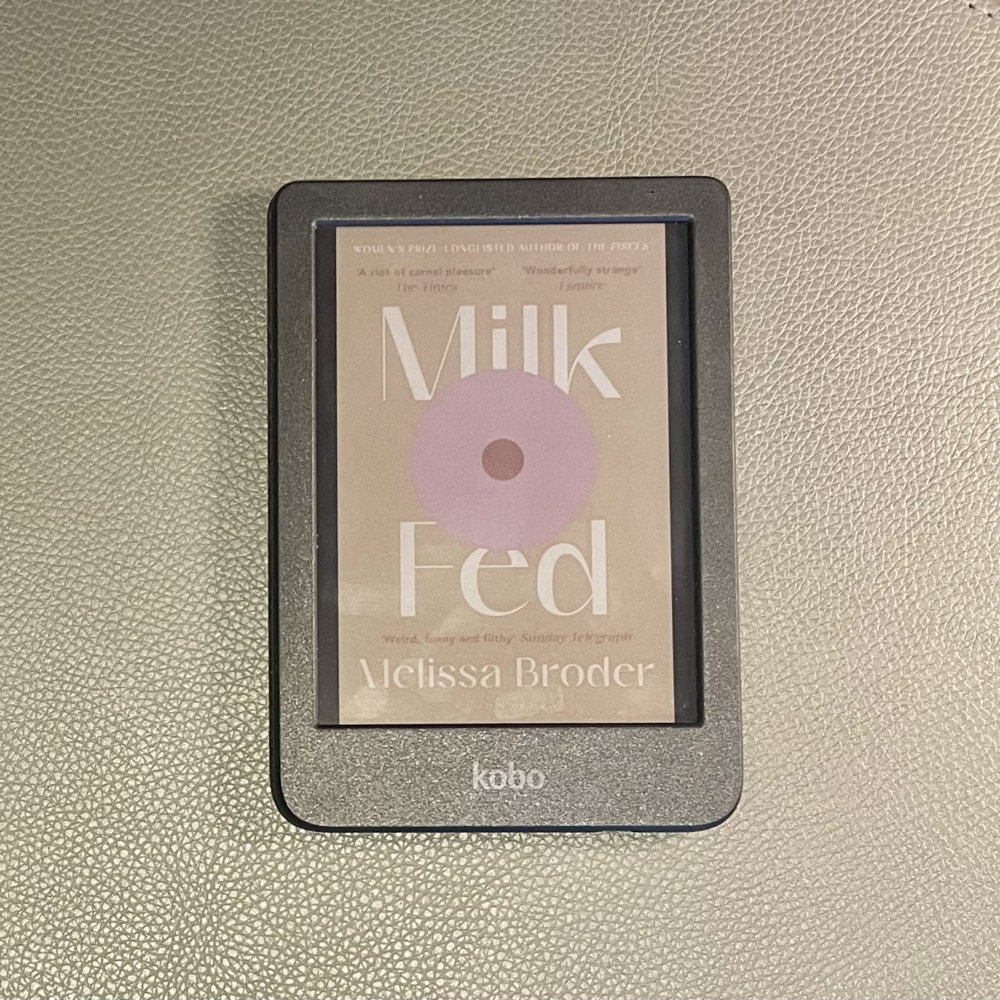‘Milk Fed’ by Melissa Broder

I can’t remember who recommended this book to me, but it was a great recommendation. Published in 2021, it is a modern American novel written in a similar style to, say, Eliza Clark’s British novels: of its time, snarky, funny, and with quite a lot of sex—but also with a beautiful clarity of expression and a lot of relevant things to say about the modern world.
Border is better-known for her five poetry collections. I haven’t read any of them, but the poetic style of writing, where every word is weighed and considered, seems to me to feed through to this novel.
The central character is a young woman who works for a Hollywood talent agency, though does not enjoy the work, and does stand-up comedy on the side. She obsessively counts calories in an attempt to maintain a slender figure. She is from a Jewish family, though has strained family relationships, especially with her mother—who was a major driver of her disordered relationship with food.
The main thrust of the plot is in this character falling for another female character, with a closeknit family who places no weight on maintaining a figure or watching what she eats— but, like us all, has her own psychological demons.
Broder makes this an enormously engaging tale, suffused with humour, and which I both raced through and didn’t want to end. It is certainly one of my favourite novels of the year so far, and the characters will live long in my memory.
Some passages which I noted down:
My mother gave birth to twins: myself and fear.
At least two days a week, I was forced to join my boss—Brett Ofer—for lunch with clients, agents, and other industry people. I didn’t like eating with others. Lunch was the crown jewel of the day, and I preferred to savour it solo, not waste it on foods I hadn’t chosen. Ofer always made us go to the same restaurant, Last Crush, which shared a parking garage with our office. He insisted we get a brunch of small plates and split everything, “family style,” as though sharing a meatball made our clients feel like brethren. Who wanted Ofer as a relative? He acted like family was a good thing.
“Setting boundaries doesn’t always feel good,” said Dr. Mahjoub. “Just because it feels bad doesn’t mean it’s wrong.”
I would not have called Jace a star. A glow-in-the-dark sticker, maybe.
Above all, she was fat: undeniably fat, irrefutably fat. She wasn’t thick, curvy, or chubby. She surpassed plump, eclipsed heavy. She was fat, and she exceeded my worst fears for my own body.
But it was as though she didn’t know or care that she was fat. If she were concerned with hiding her body, she could have worn something baggy and black. Instead, she’d stuffed herself into a straight-cut, pale blue cotton dress, modest in its long sleeves and ankle-length skirt, but otherwise revealing every stomach roll, side bulge, and back fold of her body. The soft fabric stretched and sheered as it detoured her hips and ass. Her breasts were enormous—an F cup? a G cup?—but the dress did nothing to flatter them. The dress was there and the breasts were there, and neither was cooperating with the other.
As a child, I’d seen a wide range of nonterminal illnesses amongst my young friends, as well as the delicious food cures their mothers provided. I’d prayed that I would contract tonsillitis (ice cream), a stomach virus (ginger ale), chicken pox (oatmeal bath), the flu (chicken noodle soup), swollen glands (lollipops), tooth pain (Popsicles), the common cold (more chicken noodle soup), strep throat (raw honey). But I was cursed with perfect health.
People in LA were always recommending things that were more about themselves than the recipient. They recommended obsessively—films, Netflix series—as though their association with a piece of media imbued them with sex appeal, intelligence, an irrestistable whimsy. When I felt a recommendation coming on, I’d lie and say I’d already seen the thing: just so I didn’t have to hear the plot explained. Did anyone genuinely like anything? So much art was bad. I preferred the work of dead people. At least the dead weren’t on Twitter.
My apartment was newly renovated, painted white, and existed in a timeless vacuum of nothingness. I had only my white Ikea bed, my white Ikea night table, my black Ikea sofa, and that was it. I’d thought about getting a rug, but I couldn’t commit. I felt that committing to a rug would mean I existed on the planet more than I actually wanted to exist.
From a technical standpoint, Jace was a good kisser. But making out with him in my living room felt like being under slow siege. He moved gently and caringly and that was the problem. I couldn’t tell what disgusted me more: him feigning tenderness, or the possibility that it might be real.
This post was filed under: What I've Been Reading, Melissa Broder.